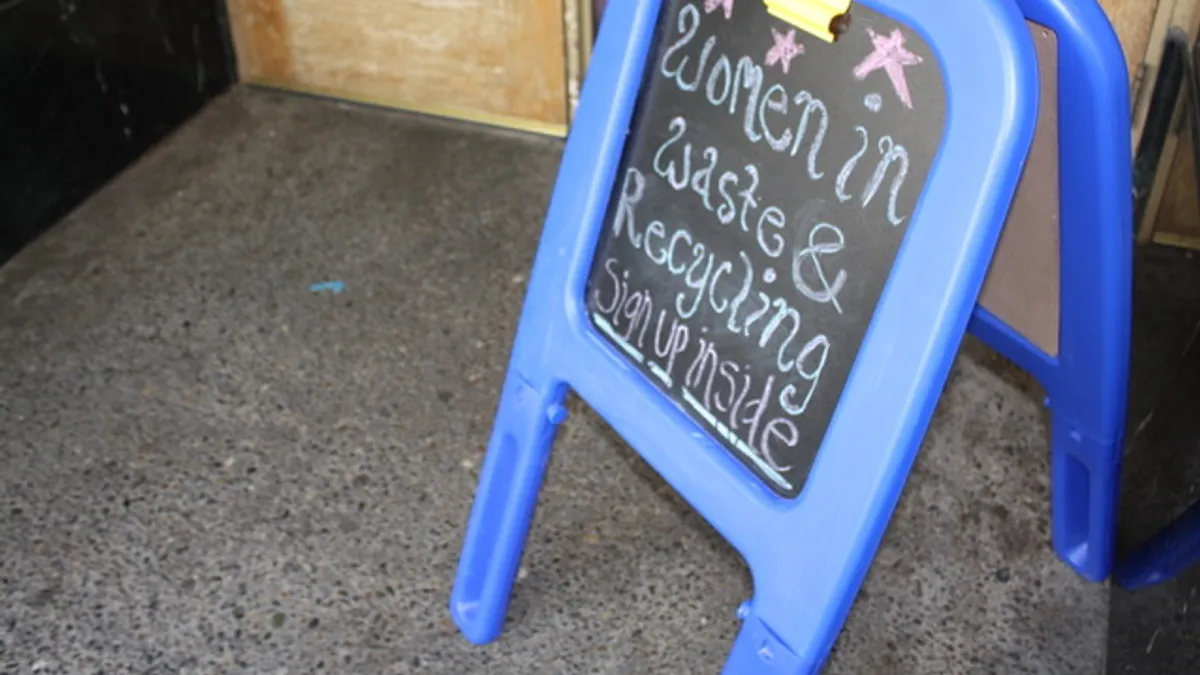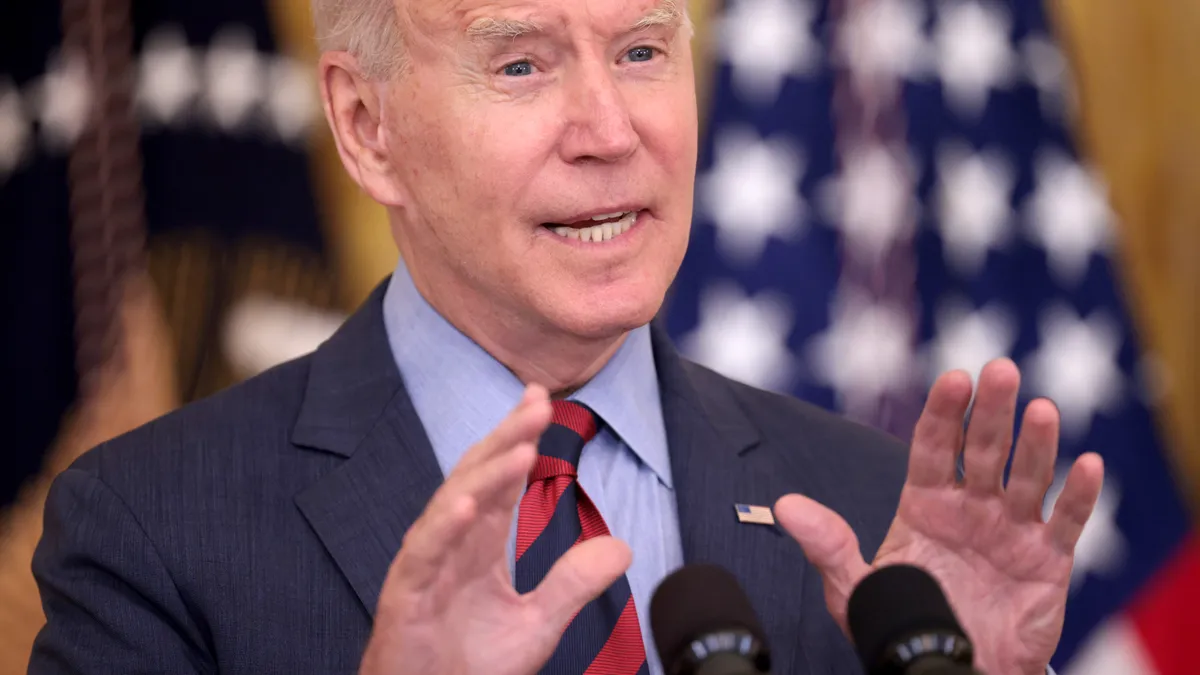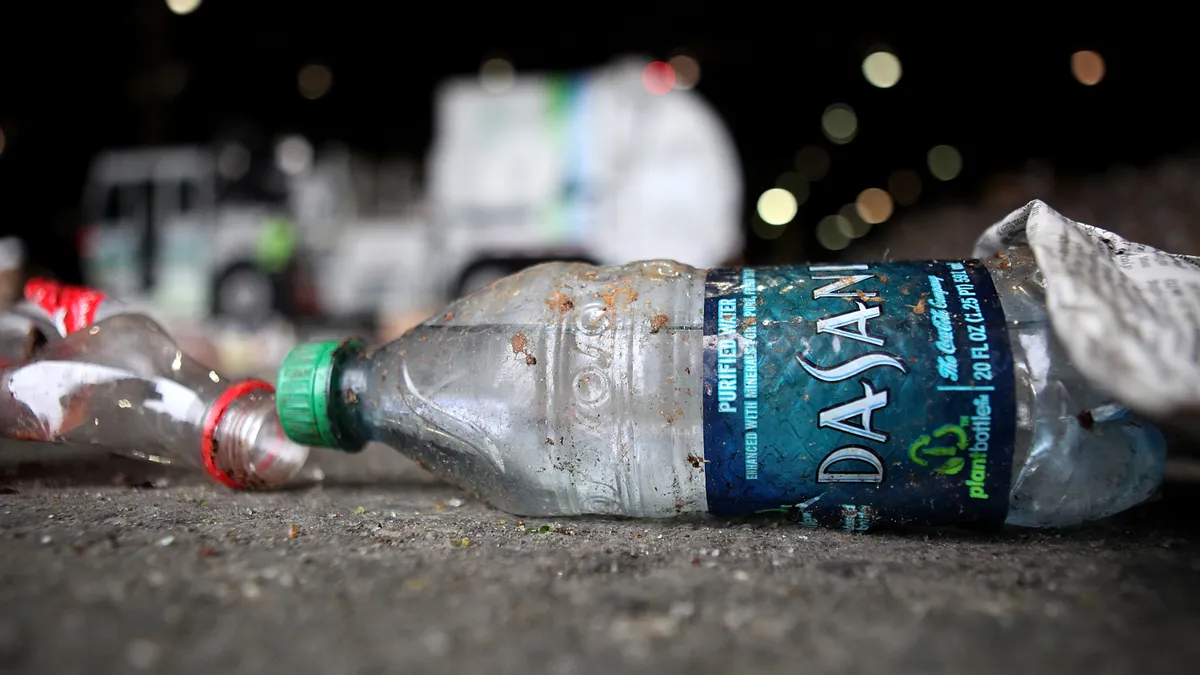"I've always had a strong entrepreneurial spirit," Rachel Oster, owner and principal of consulting firm Diversion Strategies, told Waste Dive following a recent interview. Her energy was strong as she discussed the launch of her new networking organization Women in Solid Waste & Recycling (WISR).
WISR, a first-of-its-kind membership group for industry women, has been met with great excitement and support as participants from all industry sectors have started meeting, collaborating and developing ideas to grow female representation across various industry occupations. Behind this whole effort is Oster and her business partner Erin Merrill who founded the organization on the basis of helping others.
"I came to a point in my career where I felt that I could do more to help women advance their careers in this industry by stepping outside of ... organizational and geographic boundaries," Oster explained.
Waste Dive caught up with Oster to discuss her journey into the industry, the trajectory of her career path and her passion for community growth.
WASTE DIVE: I noticed that you began your career at Recology shortly after you graduated from college. What was it like to enter the industry as a young graduate?
OSTER: I was just so happy to have a job, because my husband and I moved out from the East Coast, from Syracuse University to California, with no jobs and just dreams. No apartment ... We actually purchased a minivan before we left to fit all of our things in because we had no idea where we were going to live or anything ... Every Sunday I was sending out applications. NorCal Waste Systems called me back, and I was over the moon that it was an environmental services company, because I had studied environmental science, and waste was always very near and dear to my heart. As an anxious youngster, I would worry about like, "Where is all the garbage going?"
I was excited to get in, and I remember during one of my interviews with the COO at the time, he said to me, "Well, are you looking for a place to make friends?," and I said, "No sir, I'm looking for a place to do good work." He said, "Well, that's good, because you're probably not going to make a lot of friends here." I think what he meant was that I was different than a lot of the people they had seen over the years that were interested in a job in this industry.
That was sort of my first preview, but I started in environmental permitting, and I found out very quickly how this industry touches so many different industries and media, because it's an essential public health service, but it's still considered NIMBY at times. The permitting process was an eye-opener to that, and it was also an eye-opener of how much there needed to be collaboration between industry and government and environmental justice groups and community groups. I thoroughly enjoyed that component of it — finding middle ground and working toward solutions — because no matter how bad the NIMBY-ism got, I knew that we were doing something that an was essential public health service. Working with Recology, certainly with their progressive ideas and their vision, was just nice to know that ultimately, we were going to find solutions that worked for everyone.
"I was different than a lot of the people they had seen over the years that were interested in a job in this industry."

Rachel Oster
Owner & Principal, Diversion Strategies
You ended up leaving to start your own consulting firm (Diversion Strategies). Can you tell me a bit about this decision?
OSTER: I think it's a really exciting time in the industry right now, especially in California, leading the way with organics policy, and getting organics out of the landfill. Over my time spent in the industry, I've developed a skill set that I think is very useful, and my business partner, Erin Merrill, who also left Recology to join me...we thought we would like to offer our skill sets to the marketplace without geographic boundaries or organizational boundaries, because we're really passionate about the direction the industry is going. We are excited to lend our skill sets to all different types of projects, and that's sort of what drives us.
What was the initial motivation to launch WISR?
OSTER: I see with trade organizations across this industry that a lot of times, it's dominated by private industry within the organization. Going back to what I said about loving the collaboration between all stakeholders in this industry, I really thought there was a need for an organization that included governments, nonprofit, media, because a collaboration of all of those stakeholders is going to be what it takes to really fulfill some of the goals that the industry has set for itself, you know in terms of zero waste, and getting organics out of landfills, increasing recycling across the country ... I really saw a need not only for an organization for women, but an organization that really touched on all of the stakeholders involved in this industry.
The website describes WISR as a "networking and professional development organization." How do you anticipate that women can leverage this professional development aspect of the organization?
OSTER: I think one thing that I have heard as feedback over many years in this industry is it would be great to have like, an operations 101 course. I think some of the nervousness or the fear of diving into operations is, "I don't know operations from engineering or HR, how will I learn that?" I think by offering an operations 101 training, as well as professional development leadership skills among women in this same industry that are all wanting to learn at the same level, I think is compelling .... It would be very helpful to help organizations get their women interested in taking on roles on the operations side of the business.
How do you envision the trajectory of WISR over the next five or so years?
OSTER: What I'd love is for WISR to be an umbrella organization with chapters in the different states and areas where there's a critical mass of women in the industry ... It's a standard approach and I think it works really well, and it gives the opportunity for women to lead within their states and lead their organization themselves, with support from the greater WISR community. That's really what I envision. For myself and for my business partner Erin, we are very excited about getting this off the ground.
Ultimately, we'd love to, once we start membership services, to hire an executive director who's just as passionate as we are, and let them sort of lead the way, and us take more of a backseat. Because really my passion is sharing my skill set with companies that want to grow their diversion program.
What advice would you give women — similar to yourself, 10 year ago — who want to enter the industry but may be intimidated by the stigma or demographics?
OSTER: Find a mentor, whether it's man or a woman, that will help you understand the complexities quickly ... who can lay out to you how the industry works, sort of an overview and help you understand. I had just a wonderful mentor on the operations side, his name's Greg Pryor, and he is sort of the genius behind Recology's composting programs. I knew him from early on, but if I had really allowed him to take that mentorship role earlier on, I think I could have been brought up to speed a lot quicker, and that person will always be an advocate for you.
If you can get somebody to balance your newness with their history and respect one another for each, and I think that that's the best kind of pair that you can have.



















